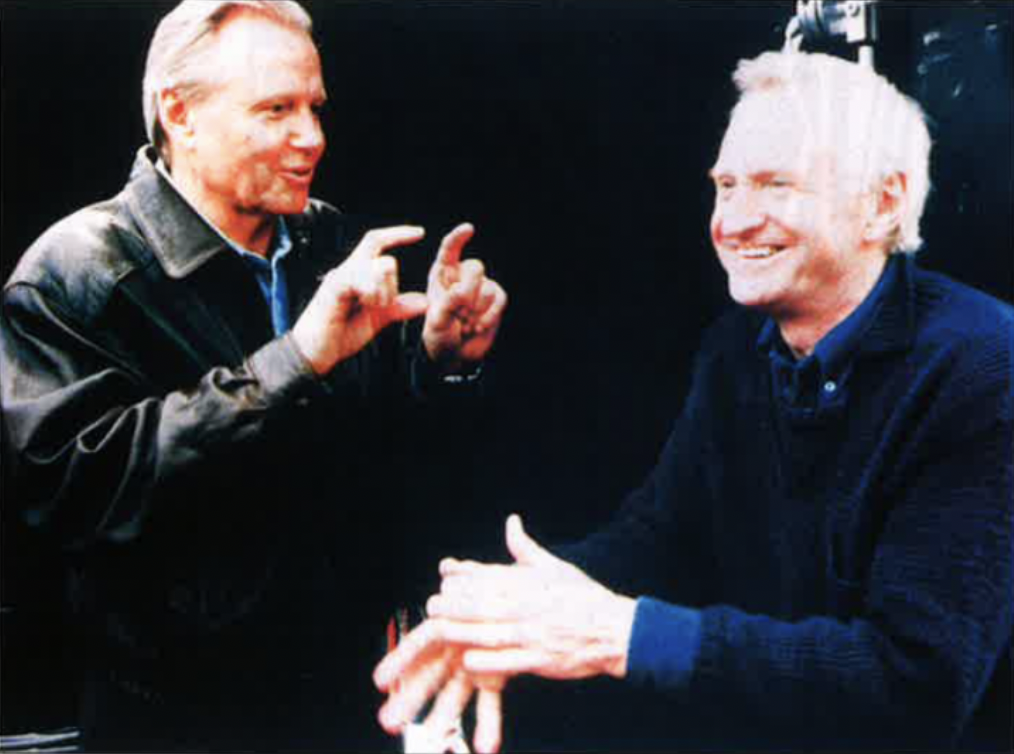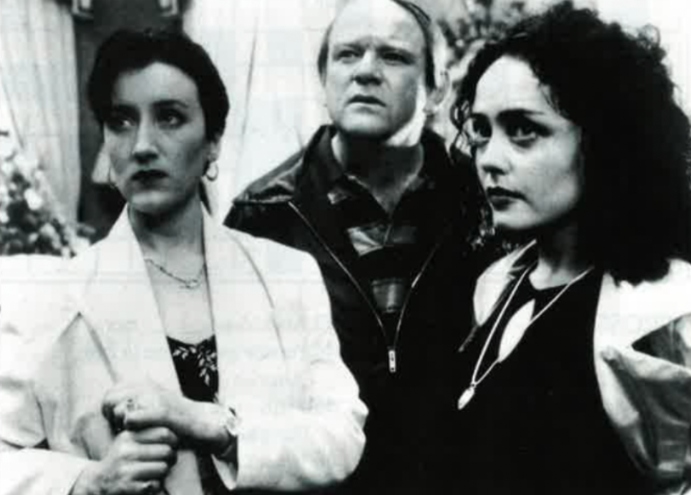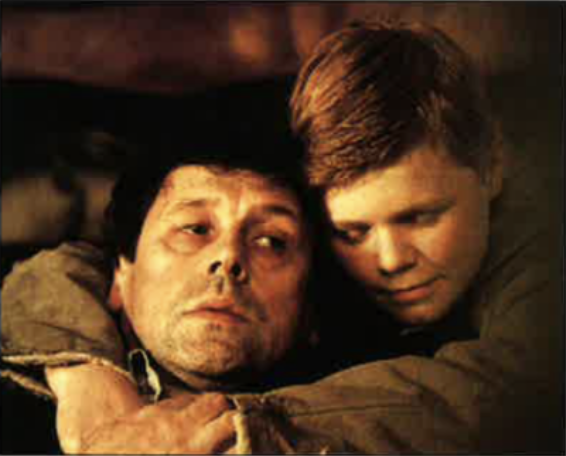One of the many positive effects of the ongoing peace process in Northern Ireland has been a deepening complexity in recent films about the Irish. With former adversaries talking peace, it’s no longer possible for Hollywood simply to sentimentalize or demonize Irish characters, as it did just a few years ago in such films as Far and Away and Patriot Games. Some of the movies’ most cherished Irish stereotypes have been rendered virtually obsolete, including those of the stage-Irish immigrant and the rabid IRA terrorist. Filmmakers have been freed to treat Irish themes with richer nuances and a greater appreciation for the gray areas in human existence. It’s no coincidence, then, that Ireland gave us two of the best films of 1998 in Neil Jordan’s The Butcher Boy and John Boorman’s The General, both of which deal critically and unflinchingly with some of the darker aspects of Irish life.
Although The Butcher Boy unfortunately did not find much of an audience last spring in American theaters, it’s one of the most disturbing films ever made on the subject of childhood. Patrick McCabe’s novel about a boy whose horrific upbringing turns him into a homicidal maniac has been audaciously filmed by Jordan with a cartoonlike visual style and a tone of black comedy that avoids facile emotional responses to the plight of young Francie Brady (an extraordinary performance by newcomer Eamonn Owens). Capturing the anxious, apocalyptic mood Ireland shared with the rest of humanity at the time of the Cuban Missile Crisis in 1962, Jordan shows how Francie’s personality is warped by his elders’ reliance on drink and superstition to cope with the pressures of a society spiraling uncontrollably into the modern world.
The satirical critique of Irish society in The Butcher Boy does not limit the meaning of Francie’s descent into madness to his particular time and place, but makes him even more frighteningly real as an archetypal figure of damaged innocence. Anyone seeking insight into the shocking wave of murderous outbursts by American schoolchildren over the last few months would be well advised to watch The Butcher Boy.
“The Butcher Boy is marvelous, isn’t it? It’s Neil Jordan’s best picture,” John Boorman told me on a visit to Los Angeles in October. Of course, the character Eamonn Owens plays in The Butcher Boy could easily grow up to be Martin Cahill. The title role of charismatic but brutal Dublin crimelord Martin Cahill in The General is shared by Owens and Brendan Gleeson, who gives a brilliant performance as the older version of the thug nicknamed for his quasi-military skills in commanding a gang of thieves. The elusive Cahill approached both his criminal career and his avant-garde sex life with a cheeky insouciance that made him something of a hero to large numbers of the Irish public before he was killed by an IRA gunman in 1994. Basing his script on a book by Dublin journalist Paul Williams, Boorman uses Cahill to explore the traditional Irish fascination with outlaws and the romantic tendency to blur the line between rebel and criminal.
An Englishman who has made his home in Ireland for twenty-five enchanted, exasperated years, Boorman has been deeply involved in all aspects of the Irish film industry, but The General is the first film he has directed in Ireland since 1980 and his first ever to deal specifically with contemporary Irish life: “One of the reasons I wanted to make the film was that it gave me a chance to say a few things about Ireland. The film is about many of the good things about Ireland and also the not-so-good things. You have this great delight in celebration, warmth, and humor, and at the same time there is this incipient violence and also what Joyce called the daily spite of this un-mannered city.”

Photo: De Lafosse
Boorman depicts Cahill as someone who could have been a great rebel or political figure but went terribly wrong. He wisely held out for casting Gleeson (who also plays Father Bubbles in The Butcher Boy) over actors who were better known internationally, having been especially impressed with the actor’s performance in a television movie as Michael Collins. The Treaty dealt with the 1921 Anglo-Irish Treaty negotiations that inexplicably were not dramatized in Jordan’s 1996 biopic Michael Collins. With his strange combination of savagery and humanity, Gleeson’s Cahill strikes one as what Collins might have been if history had not chosen him for a political role.
Boorman thinks of Cahill as an archetype that you find throughout Irish history. “Collins was a similar figure in that organizational ability, that iconoclastic, rebel cunning, the brutality, the wit. I think it stems from the old Celtic chieftains savaging each other with that great sense of celebration. Clearly that’s why The General has a tragic dimension, because you feel always that Cahill could have been something, could have been a political leader, could have been anything, really. It was circumstances that led him into this kind of life. Figures like Cahill erupt from the pagan underbelly of the nation. I always felt that Christianity in a sense was only skin-deep in Ireland, that it’s fundamentally kind of a pagan country. You feel that in the music and the behavior.”
With its crisp black-and-white photography, sinuous use of the moving camera, and jazzy score, The General harks back to the exuberant style of the British cinema of the 1960s. It has the exuberance of Boorman’s first feature, the Dave Clark Five musical Catch Us If You Can (1965), combined with the hard-edged brutality and almost surrealistic feel of his 1967 American crime movie Point Blank. Thematically and in its use of black comedy, The General also evokes such classic American gangster movies as Howard Hawks’ Scarface (1932) and Raoul Walsh’s White Heat (1949). Boorman acknowledges the latter, starting James Cagney as a psychopathic gangster, as a conscious model: “People are always talking about Brendan Gleeson as being the Irish Gerard Depardieu, and I always thought he had echoes of Cagney, with that energy and vitality and that kind of crazy humor.”
In addition to debunking Cahill’s romantically self-aggrandizing notion of the gangster as a Robin Hood figure, The General savagely lampoons the hypocrisies practiced by such Irish institutions as the Garda (police), the Catholic Church, and the IRA. “I was very glad to have a chance to take a shot at the IRA,” Boorman notes. “They were infuriated by Cahill because he was so contemptuous of them. There’s not much sense of humor, I think, in the IRA. They always had this thing of taxing or taking tithes from criminals. And even now, with the so-called peace process, they’re still fundamentally policing neighborhoods and punishing people and kneecapping.”
Boorman thinks it may take a few more years before all the political and economic changes going on in Ireland are fully reflected in movies. But it’s evident from the vitality of such films as The General and The Butcher Boy that the country’s recent evolution already has had a stimulating effect on its national cinema, encouraging more challenging examinations of the Irish character than we have ever before seen on screen.
Editor’s Note: This article was originally published in the February / March 1999 issue of Irish America.



Leave a Reply